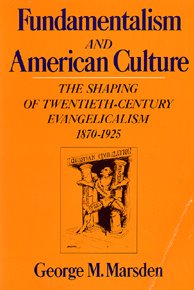
This was an outstandingly good book, not surprising given the amount of scholarly praise it has received. I read most of it for my Fundamentalism talks in the Learning Church, and managed to finish it in Germany.
Three points.
First, the ‘Babylonian captivity’ of Fundamentalism, by which I mean the way in which it accepts a Modern, scientific framework of understanding, is much more explicit in the history than I realised. I assumed that it was simply picked up by osmosis from the surrounding culture, but it was, instead, something explicitly argued for, most particularly by the Princeton school of theologians. The original Fundamentalists objected to (for example) Darwinism principally on the grounds that it was ‘bad science’, ie something based upon hypotheses rather than the assessment and classification of ‘facts’. The Fundamentalist movement gave primacy to a Baconian understanding of science (Newtonian), in which hypotheses and speculations were downplayed. The Bible was seen as a reliable source of facts, and the scientific approach was simply to aggregate these facts systematically. It seems to me that Fundamentalism can only persist through a more or less wilful self-deception, a desire not to investigate their own historical roots. Arguing with a Fundamentalist about specific points (eg evolution) won’t get anywhere, because the presuppositions are different – but NOT a presupposition to do with the place of Scripture; rather a presupposition about the nature of science. Fundamentalism has reified eighteenth century science, and given it an authority equivalent to that of Scripture. That is its principal idolatry. It may be the case that the one thing likely to free a Fundamentalist from their error is to study the history of science – for then the inheritance that Fundamentalism has received would be obvious, and its inherent lack of Scriptural authority clear.
Second, and related to my post about incarnation I was rather pleased to see many of my own perspectives articulated by the conservative evangelicals as they debated with the Fundamentalists. In particular – and a rather pointed skewering of Daniel’s ‘Barth-world’ comment – was this discussion about Augustus Strong, “the leading conservative Baptist theologian of the time… president of Rochester Theological Seminary”:
While holding a high view of Biblical authority, Strong’s starting point was that truth was not doctrinal or propositional, but rather ‘the truth is a personal Being, and that Christ himself is the Truth’. Strong attributed the intellectual difficulties in the church to a view of truth that was too abstract and literal. People mistakenly supposed that the perfection attributed to the deity could be attributed equally to statements about Christ made by the church, the ministry, the Bible, or a creed. ‘A large part of the unbelief of the present day,’ he said, ‘has been caused by the unwarranted identification of these symbols and manifestations with Christ himself. Neither the church nor ministry, Bible or creed, is perfect. To discover imperfection in them is to prove that they are not in themselves divine’. Strong rejected very explicitly the idea of Scripture as inerrant and in his influential Systematic Theology eventually dropped language that might even suggest such a conclusion. Statements similar to Strong’s could readily be found elsewhere among Baptist conservatives…
That is exactly my position – strange to think I might be aligned with Baptist conservatives (smile).
Finally, and most pertinent to our present day travails, was the way in which Marsden describes the politicisation of Fundamentalism, in terms of the desire to attain a ‘pure church‘, and the various manoeuvrings undertaken by the Fundamentalists to establish themselves in positions of power. Marsden is clear that the one thing which prevented a Fundamentalist takeover of mainstream denominations like the Presbyterians was the Scopes trial – the Fundamentalist mindset was brought up into the light, rather than being kept hidden away (as most religious debates – thankfully! – are); and once brought into the light, it withered under sustained ridicule. This seems to be the most salient difference between the Fundamentalist and conservative evangelical perspective (as I described): the Fundamentalist perspective is exclusive, and actively seeks to repudiate different forms of Christianity; the conservative evangelical perspective is inclusive, and is prepared to tolerate difference. You could say that the latter has a more fully developed understanding of adiaphora.
A scholarly book – very ‘dry’ – but not difficult to read, and absolutely fascinating. Highly recommended.
